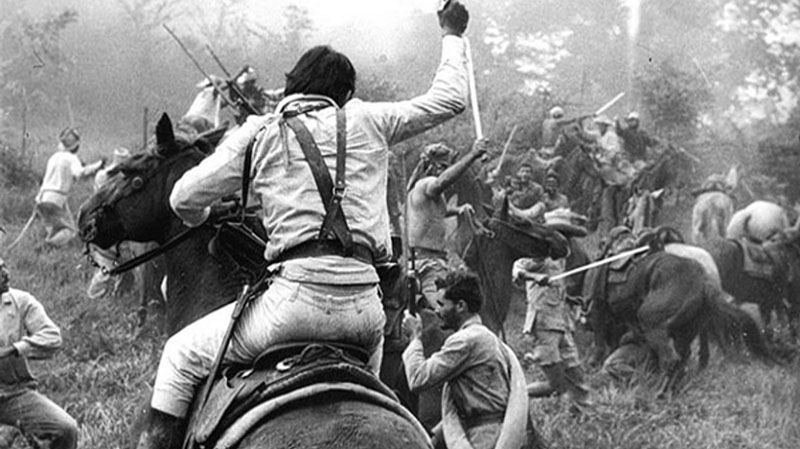February 24: Again for the Homeland
- Written by Hilda Pupo Salazar
- Published in Opinion
- Hits: 8055

José Julián Martí Pérez, the greatest Hispanic-American political thinker of the 19th century, did everything for the freedom of his idolized Cuba, from the personal example of his most absolute love: patriotism.
In the words: “We accept Money Transfers. Arturo", sent by Juan Gualberto Gómez to New York, when acceding to the emigration proposal to start the Necessary War for the definitive independence that, with the Cry of Baire, on February 24, 1895, the Cubans return to the machete, but now endowed with the fundamental principle of unity.
After several years of organization, Martí achieved the task of bringing together the mambí veterans of the so-called Ten Years' War and the Little War (La Guerra Chiquita) with the "new pines".
He dedicates himself to the preparation of the so-called Necessary War and dominates, with total accuracy, the factors that put an end to the previous conflicts, such as the internal division of the forces, the indiscipline of the troops and, in his masterful organization he did not want to trip over those fatal mistakes again.
His various trips to different American cities, together with his speeches, constitute other chosen variants for the extension of his meticulous plans.
From 1890 to 1895 he thoroughly explained his ideas to patriots from more than 60 places, the objectives of the Revolution and to raise much-needed economic funds.
He had the disadvantage of not being able to carry out the work face to face in his beloved Cuba, but he is convinced of the need to inform the decisive internal forces.
To José Dolores Poyo Estenoz, journalist, writer, poet, tobacco shop reader and close friend, he writes: "But on Sunday I continue my trip, to organize propaganda in Havana with two interviews..." Each letter reveals the connection of thought, Latin American vocation, his internationalist and blameless personal conduct.
On March 14, 1892, it was founded the Patria newspaper and on April 10, of the same year, the Cuban Revolutionary Party to join the efforts of, through the battle of ideas, unite forces for the conflagration, warn its importance, from the same roots, to make understand their ideological and organizational activity.
Convinced that the participants must be convinced of the usefulness of the event and the certainty that now, unlike the two previous contests, he has more chances of the definitive victory against Spain.
The epic of 1895 is characterized by different stages for its achievement, but the phases of dissemination and analysis of its purposes are never abandoned, even after its beginning.
Those who went to fight were aware of their place and contribution. The war was with machetes and artillery, but also a work of thought.
Martí is forced to resort to looking for arguments, theoretical support on the subject, which he considers the supreme law, root of human dignity and vital element to consider a serious action.
In January 1895, Martí gave an exemplary lesson in knowing how to overcome adversity, when having everything ready with one blow of his claw, he saw that patient work destroyed in minutes, due to the failure of the Fernandina, the name of that port, in Florida, from where the ill-fated expedition would leave.
Others, in such difficult circumstances, give up, faced with such an unexpected blow when losing the war resources to start the war, but the Island awaits for the Order of Uprising. Several letters, in those days, reflect his state of mind.
To Máximo Gómez he writes: “I stifle the indignation; but it drowns me The cowardice, and perhaps the malice, of López de Queralta, chosen by Serafín Sánchez to lead the expedition, gave up our entire plan: our three fast ships, leaving at the same time, to arrive almost at the same time, with weapons for 400 men… But we have saved more: the discipline and respect of the Island, astonished by this effort”.
To Juan Gualberto Gómez, appointed delegate of the Revolutionary Party in Cuba and responsible for leading and organizing the initial movements, he communicates: "...I will replace the useless lament with the declaration that I immediately renew in a different direction the work that the cowardice of a man has assassinated”.
Martí transcends as the most fervent communicator of his work and he was able to say it in the Montecristi Manifesto, on March 25, 1895, signed in the town of the same name, in the Dominican Republic, by him as Delegate of the Cuban Revolutionary Party and chief supreme leader of the insurrection and Máximo Gómez, as General in Chief of the independence forces, who founded the essential ideas to defeat Spanish colonialism.
Today's reality reaffirms a February 24, again for the Homeland, with the same Martí’s patriotism.
